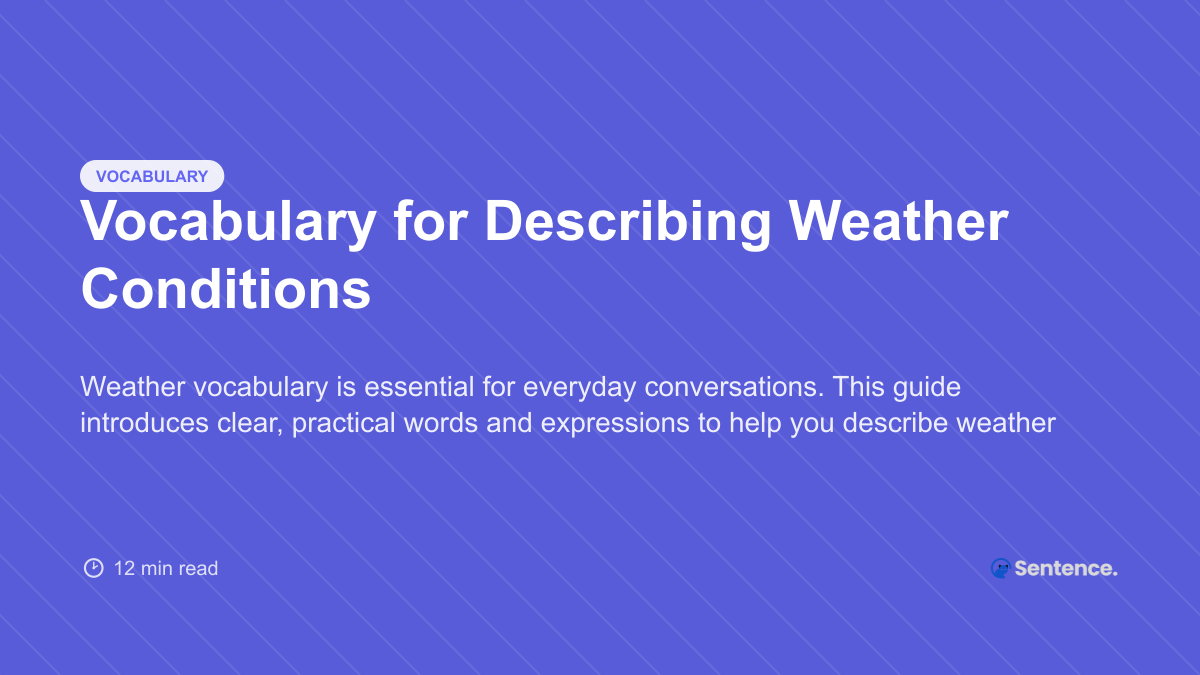
Vocabulary for Describing Weather Conditions
Weather vocabulary is essential for everyday conversations. This guide introduces clear, practical words and expressions to help you describe weather naturally and accurately.

Weather vocabulary is essential for everyday conversations. This guide introduces clear, practical words and expressions to help you describe weather naturally and accurately.
Weather is one of the most universal topics in conversations — from casual small talk to news reports and travel planning. Yet many learners still use only a few basic words like “hot,” “cold,” “rain,” or “windy.” English actually has a rich set of vocabulary to describe weather conditions more precisely and naturally.
In this article, you’ll learn useful adjectives, verbs, and nouns to talk about all types of weather. We’ll cover clear explanations, example sentences, and patterns to help you use these words confidently.
Temperature is one of the most common aspects of weather people describe. English has many words to express how warm or cold it is, with different levels of intensity.
Here are some useful terms:
| Word | Meaning | Example |
|---|---|---|
| chilly | a little cold | It's chilly this morning. |
| freezing | very cold; below zero | The wind is freezing today. |
| warm | comfortable heat | The weather feels warm now. |
| boiling | extremely hot | It’s boiling outside. Stay hydrated. |
Tip: “freezing” and “boiling” are often used informally for exaggeration in conversation.
English has many ways to describe different levels of rain. Instead of saying “It’s raining” every time, you can be more specific:
Examples:
To describe very heavy rain, native speakers often use expressions like:
Wind-related vocabulary helps express both mild breezes and more serious weather conditions.
| Word | Intensity | Example |
|---|---|---|
| breeze | light wind | A gentle breeze is blowing. |
| windy | moderate wind | It’s really windy today. |
| gust | sudden strong wind | A strong gust nearly knocked me over. |
| stormy | very strong wind + rain | The weather will be stormy tonight. |
For more extreme weather, you can use terms like “thunderstorm,” “lightning,” “hail,” and “cyclone,” depending on the severity and location.
Not all weather conditions involve rain or wind. Many days fall somewhere between bright sunshine and cloudy gray skies, and English offers a variety of vocabulary to express these subtle differences. These words are especially useful when describing weather for travel, photography, outdoor activities, or simply giving a more accurate picture of your surroundings. Learning specific sky-related vocabulary helps you avoid overusing basic terms like “sunny” or “cloudy” and lets you describe the exact atmosphere outside — whether it feels warm and cheerful, dull and gray, or heavy and humid.
Examples:
Note the difference:
Weather vocabulary becomes much easier to remember when you connect it to real experiences. Instead of memorizing lists, try imagining the last time you walked outside in different conditions — maybe a hot, humid afternoon, a chilly morning breeze, or a dark, overcast sky before a storm. By linking each word to a real moment or mental picture, you strengthen your recall and make the word meaningful. Another effective strategy is repetition through daily observation: every time you look outside, choose one new vocabulary word to describe what you see. This small habit builds fluency without feeling like a study session.
Memory Tip:
Use a more precise word whenever possible — drizzle, breeze, overcast — to sound more natural.
Answers: pouring / overcast / breeze / humid
⭐ Pro Tip: Weather vocabulary is perfect for small talk — precise words help you sound fluent and expressive.
Weather vocabulary goes far beyond basic words like “hot” or “rainy.” By learning more specific terms for temperature, rain, wind, and sky conditions, you can describe the world around you more accurately and naturally. With regular use, these words will become a natural part of your speaking and writing. Try using one or two new weather expressions each day to build confidence and fluency.